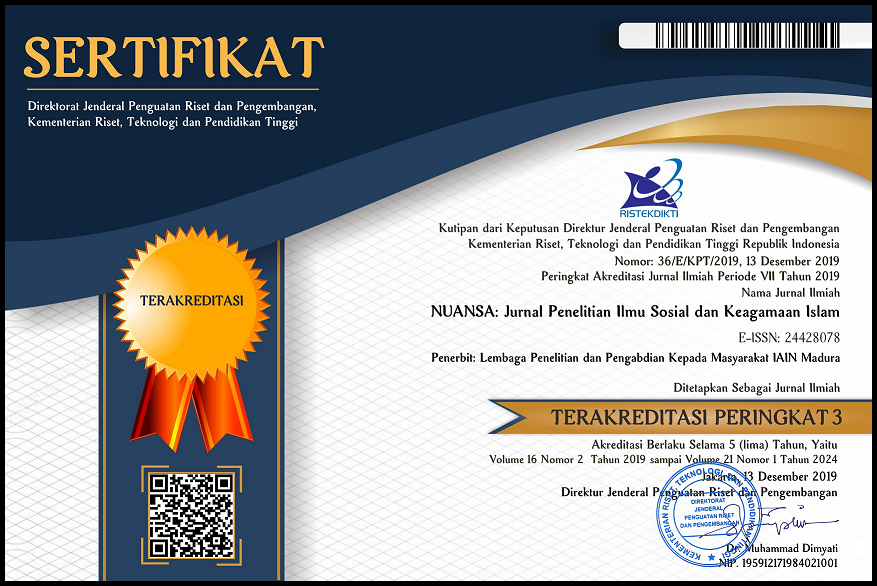Dualisme Pengetahuan Agama: Dinamika Religiusitas Siswa Muslim di SD Kristen Purbo
 Abstract views: 375
,
Abstract views: 375
,
 pdf downloads: 244
pdf downloads: 244
Abstract
Every child has the right to receive religious subjects that he adheres to. When children get different religious subjects, it will become a dualism of understanding in religion. The purpose of this study was to explain the dynamics of religiosity of Muslim students at Purbo Christian Elementary School. This research includes field research using a qualitative method approach. The subjects of this study were 7 Muslim students in grades 4 to 6, parents of Muslim students, classroom teachers, and the principal of SD Kristen Purbo. Methods of data collection using interviews, observation, and documentation. Data analysis by means of data reduction, data presentation, and conclusions. The results showed that the religiosity of Muslim students at Purbo Christian Elementary School was still the same in general, Muslim students who were adjusted to their development, such as still finding it difficult to pray fardu prayers, and still being egocentric. Children will be more interested in annual worship, such as fasting in Ramadan, Islamic holidays. In addition, children are also more interested in religious activities that are collective and entertaining for children.
(Setiap anak berhak mendapatkan mata pelajaran agama yang dianutnya. Ketika anak malah mendapatkan mata pelajaran agama yang berbeda, maka akan menjadi dualisme pemahaman dalam konsep beragamanya. Tujuan penelitian ini adalah untuk menjelaskan dinamika religiusitas siswa Muslim SD Kristen Purbo. Penelitian ini termasuk penelitian lapangan dengan menggunakan pendekatan kualitatif. Subjek penelitian ini adalah 7 siswa Muslim kelas 4 sampai kelas 6, orang tua siswa Muslim, guru kelas, dan kepala sekolah SD Kristen Purbo. Metode pengumpulan data dengan menggunakan wawancara, observasi, dan dokumentasi. Analisis data dengan cara reduksi data, penyajian data, dan kesimpulan. Hasil penelitian menunjukkan bahwa religiusitas siswa Muslim SD Kristen Purbo masih sama pada umumnya siswa Muslim yang disesuaikan dengan perkembangannya, seperti masih sulitnya untuk ibadah salat fardu, dan masih bersikap egosentris. Anak akan lebih tertarik dengan ibadah yang sifatnya tahunan, seperti puasa Ramadan, hari raya kebesaran Islam. Selain itu, anak juga lebih tertarik pada kegiatan keagamaan yang sifatnya kolektif dan menghibur bagi anak.)
Downloads
References
Abdurahman, Dudung. Metode Penelitian Agama Pendekatan Multidisipliner. Yogyakarta: Lembaga Penelitian UIN Sunan Kalijaga Yogyakarta, 2006.
Ahyadi, Abdul Aziz. Psikologi Agama (Kepribadian Muslim Pancasila). Bandung: Sinar Baru Algensindo, 2001.
Ancok, Djamaludin, dan Fuat Nashori Suroso. Psikologi Islami; Solusi Islam Atas Problem-Problem Psikologi. Yogyakarta: Pustaka Pelajar, 2008.
Ayers, Samuel J., dan Shelly Reid. “Teaching about Religion in Elementary School: The Experience of One Texas District.” The Social Studies 96, no. 1 (1 Januari 2005): 14–17. https://doi.org/10.3200/TSSS.96.1.14-17.
Bandura, Albert. Social Cognitive Theory of Personality. New York: Academic Press, 1999.
Berk, Laura E. Development Through The Lifespan. Yogyakarta: Pustaka Pelajar, 2012.
Cartledge, G., dan J.F. Millburn. Teaching Social Skills to Children &Youth. Innovative Aproach. Massachussets: Allyn & Bacon, 1995.
Clayton, Richard R., dan James W. Gladden. “The Five Dimensions of Religiosity: Toward Demythologizing a Sacred Artifact.” Journal for the Scientific Study of Religion 13, no. 2 (1974): 135–43.
Cornwall, Marie, Stan L. Albrecht, Perry H. Cunningham, dan Brian L. Pitcher. “The Dimensions of Religiosity: A Conceptual Model with an Empirical Test.” Review of Religious Research 27, no. 3 (1986): 226–44. https://doi.org/10.2307/3511418.
Danim, Sudarmawan. Psikologi Pendidikan dalam Perspektif Baru. Bandung: Alfabeta, 2010.
Daradjat, Zakiah. Ilmu Jiwa Agama. Jakarta: PT Bulan Bintang, 1996.
Desmita. Psikologi Perkembangan. Bandung: PT Remaja Rosdakarya, 2016.
———. Psikologi Perkembangan Peserta Didik. Bandung: PT Remaja Rosdakarya, 2010.
Durkheim, Emil. The Elementary Forms of the Religious Life. New York: Free Press, 1935.
El-Menouar, Yasemin. “The Five Dimensions of Muslim Religiosity.” Methoden, Daten, Analysen 8, no. 1 (1 Januari 2014): 53–78. https://doi.org/10.12758/mda.2014.003.
Exline, Julie J., ed. “Religious and spiritual struggles.” Dalam APA handbook of psychology, religion, and spirituality (Vol 1): Context, theory, and research, 459–75. APA handbooks in psychology®. Washington, DC, US: American Psychological Association, 2013. https://doi.org/10.1037/14045-025.
Fridayanti. “Religiusitas, Spiritualitas Dalam Kajian Psikologi Dan Urgensi Perumusan Religiusitas Islam.” Psympathic : Jurnal Ilmiah Psikologi 2, no. 2 (2015): 199–208. https://doi.org/10.15575/psy.v2i2.460.
Gallagher, Sally K. “Children as Religious Resources: The Role of Children in the Social Re-Formation of Class, Culture, and Religious Identity.” Journal for the Scientific Study of Religion 46, no. 2 (2007): 169–83. https://doi.org/10.1111/j.1468-5906.2007.00349.x.
Hemming, Peter J., dan Nicola Madge. “Researching Children, Youth and Religion: Identity, Complexity and Agency.” Childhood 19, no. 1 (1 Februari 2012): 38–51. https://doi.org/10.1177/0907568211402860.
Hidayah, Nur, dan Adi Atmoko. Landasan Sosial Budaya dan Psikologi Pendidikan. Malang: Penerbit Gunung Samudera [ Grup Penerbit Pt Book Mart Indonesia ], 2014.
Holdcroft, Barbara. “What is Religiosity?” Catholic Education: A Journal of Inquiry and Practice 10, no. 1 (September 2006): 89–103.
Hood, Ralph W. The Psychology of Religion. London: The Guildford Press, 1996.
Hood, Ralph W., Peter C. Hill, dan Bernard Spilka. The Psychology of Religion, Fourth Edition: An Empirical Approach. Fourth. New York: Guilford Press, 2009.
Huber, Stefan, dan Odilo W. Huber. “The Centrality of Religiosity Scale (CRS).” Religions 3, no. 3 (September 2012): 710–24. https://doi.org/10.3390/rel3030710.
Jalaludin. Psikologi Agama. Jakarta: Raja Grafindo Persada, 2014.
James, William. The Varieites of Religious Experience. Yogyakarta: IRCiSoD, 2015.
Jensen, Larry, dan Janet Jensen. “Family Values, Religiosity, and Gender.” Psychological Reports 73, no. 2 (1 Oktober 1993): 429–30. https://doi.org/10.2466/pr0.1993.73.2.429.
Kartikowati, Endang dan Zubaedi. Psikologi Agama dan Psikologi Islami: Sebuah Komparasi. Jakarta: Kencana, 2016.
Khambali, Khambali. “Family Role in Shaping Character Islam in Early Childhood Through Habituation Method.” Ta’dib : Jurnal Pendidikan Islam 6, no. 1 (20 Juli 2017): 155–63. https://doi.org/10.29313/tjpi.v6i1.2382.
Khoiruzzadi, Muhammad, dan Tiyas Prasetya. “Perkembangan Kognitif dan Implikasinya dalam Dunia Pendidikan:” Madaniyah 11, no. 1 (31 Januari 2021): 1–14.
Lewis, Christopher Alan, dan Sharon Mary Cruise. “Religion and happiness: Consensus, contradictions, comments and concerns.” Mental Health, Religion & Culture 9, no. 3 (1 Juni 2006): 213–25. https://doi.org/10.1080/13694670600615276.
Lubis, Rahmat Rifai. “Optimalisasi Kecerdasan Spiritual Anak.” Jurnal Al-Fatih 1, no. 1 (23 Juli 2018): 1–18.
Mangunwijaya, Y.B. Menumbuhkan Sikap Religiusitas Anak-Anak. Jakarta: Gramedia, 1986.
Miles, Matthew B., dan A. Michael Huberman. Qualitative Data Analysis: An Expanded Sourcebook. Thousand Oaks: SAGE Publications, 1994.
Myers, Scott M. “An Interactive Model of Religiosity Inheritance: The Importance of Family Context.” American Sociological Review 61, no. 5 (1996): 858–66. https://doi.org/10.2307/2096457.
Ormrod, Jeanne Ellis. Psikologi Pendidikan Membantu Siswa Tumbuh dan Berkembang. Vol. 1. Jakarta: Penerbit Erlangga, 2009.
Rahmat, Jalaludin. Psikologi Agama Memahami Perilaku Keagamaan dengan Mengaplikasikan Prinsip-prinsip Psikologi. Jakarta: PT Raja Grafindo Persada, 2008.
Ramayulis. Pengantar Psikologi Agama. Jakarta: PT Raja Grafindo Persada, 2002.
———. Psikologi Agama. Jakarta: Kalam Mulia, 2013.
Rohmah, Noer. Pengantar Psikologi Agama. Yogyakarta: Teras, 2013.
Santrock, Jhon W. Psikologi Pendidikan. Jakarta: Salemba Humanika, 2009.
Savira, Liza, Subiyantoro Subiyantoro, dan Raudah Devi Ekasari. “Perkembangan Nilai Agama Dan Moral Siswa Usia Dasar.” Pionir: Jurnal Pendidikan 9, no. 2 (31 Desember 2020): 126–34. https://doi.org/10.22373/pjp.v9i2.9085.
Siswanto, Wahyudi, Lilik Nur Kholidah, dan Sri Utami Minarti. Membentuk Kecerdasan Spiritual Anak: Pedoman Penting Bagi Orang Tua dalam Mendidik Anak. Jakarta: Amzah, 2010.
Solikhin, Muhammad. Ritual dan Tradisi Islam Jawa. Yogyakarta: Narasi, 2010.
Stolzenberg, Ross M., Mary Blair-Loy, dan Linda J. Waite. “Religious Participation in Early Adulthood: Age and Family Life Cycle Effects on Church Membership.” American Sociological Review 60, no. 1 (1995): 84–103. https://doi.org/10.2307/2096347.
Suparno, Paul. Teori Perkembangan Kognitif Jean Piaget. Yogyakarta: Penerbit Kanisius, 2012.
Suryono dan Haryanto. Belajar Dan Pembelajaran Teori Dan Konsep Dasar. Bandung: Remaja Rosdakarya, 2012.
Tarakeshwar, Nalini, Jeffrey Stanton, dan Kenneth I. Pargament. “Religion: An Overlooked Dimension in Cross-Cultural Psychology.” Journal of Cross-Cultural Psychology 34, no. 4 (1 Juli 2003): 377–94. https://doi.org/10.1177/0022022103034004001.
Taubah, Mufatihatut. “Pendidikan Anak Dalam Keluarga Perspektif Islam.” Jurnal Pendidikan Agama Islam (Journal of Islamic Education Studies) 3, no. 1 (2015): 109–36. https://doi.org/10.15642/jpai.2015.3.1.109-136.
Vieten, Cassandra, Shelley Scammell, Ron Pilato, Ingrid Ammondson, Kenneth I. Pargament, dan David Lukoff. “Spiritual and religious competencies for psychologists.” Psychology of Religion and Spirituality 5, no. 3 (2013): 129–44. https://doi.org/10.1037/a0032699.
Watson, Jacqueline. “Whose Model of Spirituality Should Be Used in the Spiritual Development of School Children?” International Journal of Children’s Spirituality 5, no. 1 (1 Juni 2000): 91–101. https://doi.org/10.1080/713670894.
Webb, Marcia, dan Kara J. Otto Whitmer. “Parental religiosity, abuse history and maintenance of beliefs taught in the family.” Mental Health, Religion & Culture 6, no. 3 (1 November 2003): 229–39. https://doi.org/10.1080/1367467021000038156.
Zola, Nilma, Asmidir Ilyas, dan Yusri Yusri. “Karakteristik Anak Bungsu.” Jurnal Konseling Dan Pendidikan 5, no. 3 (28 Desember 2017): 109–14. https://doi.org/10.29210/120100.
The journal operates an Open Access policy under a Creative Commons Attribution-NonCommercial 4.0 International License (CC-BY-NC) 
Authors who publish with this journal agree to the following terms:
- Authors retain copyright and grant the journal right of first publication with the work simultaneously licensed under a Creative Commons Attribution License that allows others to share the work with an acknowledgement of the work's authorship and initial publication in this journal.
- Authors are able to enter into separate, additional contractual arrangements for the non-exclusive distribution of the journal's published version of the work (e.g., post it to an institutional repository or publish it in a book), with an acknowledgement of its initial publication in this journal.
- Authors are permitted and encouraged to post their work online (e.g., in institutional repositories or on their website) prior to and during the submission process, as it can lead to productive exchanges, as well as earlier and greater citation of published work.





















